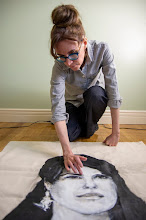Friday, June 12, 2009
The librarian will see you now
"One of them pointed to my white coat and asked, 'Are you a doctor?' 'No,' I laughed. 'I'm a librarian'."
Yesterday, my sister and I had plans to go to the MoMA after her flight arrived from Canada. We agreed to meet by the information stand in Grand Central Terminal. During the hour that I waited, I overheard the staff person skillfully handle the flurry of questions from tourists. He never wavered for a second, making me more than a little envious of his reference skills. The questions were all directional except for one: “Can you make an announcement over the loudspeaker to help this young girl who has been separated from her mother?” About a minute after the mother was paged, she rushed over. I realized that she couldn’t see her daughter because of the curved shape of the information stand, so I shouted, “She’s over there” and pointed. If she registered what I said, it was unconscious: the biological imperative had taken hold and it was as if nothing existed but parent and child.
Here’s a more lighthearted story about trying to be helpful. Last week on the bus, two students from Boston and Philadelphia asked me how they could get from the bus station to the train station in White Plains. Having just left the library, I was still in reference mode so I escorted them there, showed them where to board their train, and advised them to purchase tickets from the machine to save money. One of them pointed to my white coat and asked, “Are you a doctor?” “No,” I laughed. “I’m a librarian.”
The question made me wonder, are there any commonalities between medical professionals and information professionals aside from coincidental wardrobe choices? My answer is based on fantasy and reality, as I’ve watched quite a bit of Grey’s Anatomy. (Seriously? Yes. The television show went a long way towards helping me process a rare medical emergency experienced by a loved one, whose real-life doctors have inspired me with their brilliance, patience and support).
Much like librarians, medical professionals conduct public service and want to educate and empower the people with whom they interact. The stakes are high for them: they do everything in their power to improve the health of their patients, knowing that not all of them will survive or improve, which in the grand scheme of things is more important than feeling comfortable with federated searching of databases.
I used to see reference instruction as an all-or-nothing scenario, in which I felt defeated if I didn't help the student depart with the optimal skill set. Lately, however, I’ve been thinking that I should approach reference service more like a doctor—I should strive for the best but take satisfaction in progress of any sort. Trying this on for size would entail taking the oath,‘first, do no harm.’ That seems like a sound strategy. When users enter the library, it is very important for them to feel welcome and to know that they can ask for help. In our library, help comes in many forms: in-person reference at a desk or by appointment with a subject specialist, chat reference, email reference, and my favourite—roving reference.
As I arrived on campus this morning, I was thinking that maybe it’s less important that the user remember the details of a reference encounter than it is for them to leave feeling supported (much like the woman in the train station who likely absorbed my efforts to help but couldn’t identify me in a lineup if she tried). I stopped into Starbucks on my way to the library and was greeted by a summer student. “You helped me on my first day,” he said. I remembered, but I hadn’t expected him to remember. I could barely contain my smile. What a great way to start a Friday…
Subscribe to:
Post Comments (Atom)

No comments:
Post a Comment